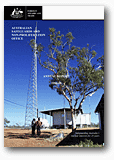


Annual Report 1998-99 |
 |
COMPREHENSIVE NUCLEAR-TEST-BAN TREATY
DEVELOPMENTS TOWARDS A BWC VERIFICATION PROTOCOL
Australia is currently involved in international negotiations for a verification protocol to the Biological Weapons Convention. While there is a treaty on biological weapons that has been in place since 1975 it has not been backed up by a mechanism to verify compliance and, moreover, some countries may still be producing such weapons. The objective of the protocol is to create a verification regime that will make it more difficult for Member States to produce biological weapons.
Australia is pursuing an initiative, first announced by the Prime Minister in March 1998, to accelerate the negotiation of a verification protocol. In September 1998, at Mr Downer’s direction, Australia convened an Informal Ministerial Meeting in New York to inject greater political impetus into the process.
When concluded, the protocol is likely to have implications for those engaged in biotechnological activities since legitimate biotechnological activities can have potential application in the production of biological weapons. Moreover, the types of processes involved in the production of biological weapons are also very commonly used, for example, in the production of vaccines. The protocol is likely to contain provisions requiring some biotechnology companies, universities and other institutions to submit annual declarations on their activities and to accept infrequent visits from an international inspection team.
Given the complexities of negotiations, it has been difficult to estimate the number of facilities in Australia likely to be affected by the protocol. This is especially the case given the possible permutations of declaration triggers currently under consideration. In an attempt to assess the potential impact of the protocol on commercial facilities in Australia, ASNO conducted a survey of companies engaged in biotechnological activities. In particular, the survey was designed to focus on six key areas, namely, microbiological production, work with microorganisms and/or toxins, genetic manipulation of organisms, aerosol dissemination, biocontainment and biodefence programmes.
In total, 52 companies were assessed as likely to be affected by the protocol and therefore surveyed. Of those companies surveyed, 45 responded. An analysis of the results suggests that the protocol is likely to have only a modest impact on the biotechnology industry in Australia, with perhaps between five and 10 companies affected, depending on how the negotiations proceed. This assessment, however, is complicated by the possibility of additional facilities being captured under combinations and/or modifications to the declaration triggers being agreed during ongoing negotiations.
The results of the survey were discussed at the second BWC National Consultative Group meeting held in Canberra in June 1999. At this meeting it was decided that ASNO should also investigate the likely impact of the verification protocol on government facilities in Australia, including hospitals and universities. Preliminary analysis suggests the number of government facilities likely to be affected will be greater than the number of commercial facilities.